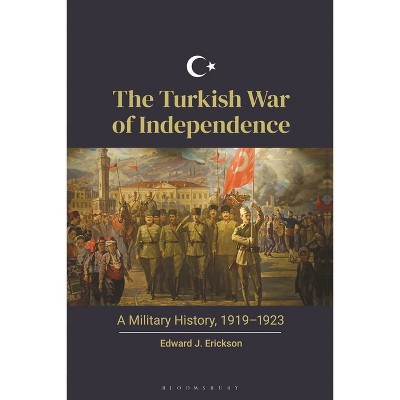Sponsored

Defeat in Detail - by Edward J Erickson (Hardcover)
In Stock
Sponsored
About this item
Highlights
- No critical analysis has ever examined the specific reasons for the Ottoman defeat.
- About the Author: EDWARD J. ERICKSON, is the author of Ordered to Die (Praeger, 2000).
- 432 Pages
- History, Military
Description
About the Book
No critical analysis has ever examined the specific reasons for the Ottoman defeat. Erickson's study fills this gap by studying the operations of the Ottoman Army from October 1912 through July 1913, and by providing a comprehensive explanation of its doctrines and planning procedures. This book is written at an operational level that details every campaign at the level of the army corps. More than 30 maps, numerous orders of battle, and actual Ottoman Army operations orders illustrate how the Turks planned and fought their battles. Of particular note is the inclusion of the only detailed history in English of the Ottoman X Corps' Sarkoy amphibious invasion. Also included are definitive appendix about Ottoman military aviation and a summary of the Turks' efforts to incorporate the lessons learned from the war into their military structure in 1914.
The Ottoman Empire fought the Balkan Wars of 1912-1913 against the joint forces of Bulgaria, Greece, Montenegro, and Serbia--and was decisively defeated. The Ottoman Army is frequently depicted as a mob of poorly clad, faceless Turks inept in their attempts to fight a modern war. Yet by 1912, the Ottoman Army, which was constructed on the German model, was in many ways more advanced than certain European armies.
Book Synopsis
No critical analysis has ever examined the specific reasons for the Ottoman defeat. Erickson's study fills this gap by studying the operations of the Ottoman Army from October 1912 through July 1913, and by providing a comprehensive explanation of its doctrines and planning procedures. This book is written at an operational level that details every campaign at the level of the army corps. More than 30 maps, numerous orders of battle, and actual Ottoman Army operations orders illustrate how the Turks planned and fought their battles. Of particular note is the inclusion of the only detailed history in English of the Ottoman X Corps' Sarkoy amphibious invasion. Also included are definitive appendix about Ottoman military aviation and a summary of the Turks' efforts to incorporate the lessons learned from the war into their military structure in 1914.
The Ottoman Empire fought the Balkan Wars of 1912-1913 against the joint forces of Bulgaria, Greece, Montenegro, and Serbia--and was decisively defeated. The Ottoman Army is frequently depicted as a mob of poorly clad, faceless Turks inept in their attempts to fight a modern war. Yet by 1912, the Ottoman Army, which was constructed on the German model, was in many ways more advanced than certain European armies.Review Quotes
?[C]ontribution Erickson has made in opening up a neglected field of study for historians.?-The Journal of Military History
?[E]xceptionally well produced....Erickson fills a gap in the literature with a detailed consideration of the reasons for Ottoman defeat through reviewing operations at a micro level from the perspective of their corps. No one is more qualified than he to undertake such a study....[a]s a campaigns history this volume is hard to fault. It builds its case brick by brick, and the sectionalized approach renders it easy to follow. Highly recommended. builds its case brick by brick, and the sectionalized approach renders it easy to follow. Highly recommended.?-Middle East Journal
?[T]his is a critical and balanced analysis that serves two purposes: it contributes to the historical reconstruction of the Balkan wars while enhancing the reader's understanding of Ottoman military thinking at the outbreak of the First World War, an event that so deeply affected the future of the middle east.?-War in History
?Defeat in Detail succeeds on a major scale to present the first accurate picture ... of the Ottoman Army during the Balkan Wars. Erickson does an excellent job of not only narrating the military engagements of the war, but also of contextualizing the development of Ottoman arms in light of major events in the Balkans ... Defeat in Detail is sure to be a welcome addition to the library of any war buff or those interested in the history of the Balkans at a turbulent and fascinating time.?-balkananalysis.com
?Positive and negative aspects of the Turkish Army and its performance, plus its force structure and doctrine are chronicled, but the inescapable conclusion is that it failed the supreme test on the battlefield. Superbly researched, with excellent maps, informative tables, and descriptive chapter endnotes, Defeat in Detail makes a major contribution to Turkish and Balkan military history.?-Military Heritage
?The book is based on a careful and informed reading of a broad range of secondary sources and official publications in Turkish, English, and German. Erickson's style is direct, practical, dispassionate, and balanced, and his clear structure makes for a detailed but readable account. This significant and welcome contribution to the literature on the Balkan Wars should prove useful for all students of military history.?-The International History Review
"ÝC¨ontribution Erickson has made in opening up a neglected field of study for historians."-The Journal of Military History
"ÝE¨xceptionally well produced....Erickson fills a gap in the literature with a detailed consideration of the reasons for Ottoman defeat through reviewing operations at a micro level from the perspective of their corps. No one is more qualified than he to undertake such a study....Ýa¨s a campaigns history this volume is hard to fault. It builds its case brick by brick, and the sectionalized approach renders it easy to follow. Highly recommended. builds its case brick by brick, and the sectionalized approach renders it easy to follow. Highly recommended."-Middle East Journal
"ÝT¨his is a critical and balanced analysis that serves two purposes: it contributes to the historical reconstruction of the Balkan wars while enhancing the reader's understanding of Ottoman military thinking at the outbreak of the First World War, an event that so deeply affected the future of the middle east."-War in History
"[C]ontribution Erickson has made in opening up a neglected field of study for historians."-The Journal of Military History
"[T]his is a critical and balanced analysis that serves two purposes: it contributes to the historical reconstruction of the Balkan wars while enhancing the reader's understanding of Ottoman military thinking at the outbreak of the First World War, an event that so deeply affected the future of the middle east."-War in History
"Defeat in Detail succeeds on a major scale to present the first accurate picture ... of the Ottoman Army during the Balkan Wars. Erickson does an excellent job of not only narrating the military engagements of the war, but also of contextualizing the development of Ottoman arms in light of major events in the Balkans ... Defeat in Detail is sure to be a welcome addition to the library of any war buff or those interested in the history of the Balkans at a turbulent and fascinating time."-balkananalysis.com
"Positive and negative aspects of the Turkish Army and its performance, plus its force structure and doctrine are chronicled, but the inescapable conclusion is that it failed the supreme test on the battlefield. Superbly researched, with excellent maps, informative tables, and descriptive chapter endnotes, Defeat in Detail makes a major contribution to Turkish and Balkan military history."-Military Heritage
"The book is based on a careful and informed reading of a broad range of secondary sources and official publications in Turkish, English, and German. Erickson's style is direct, practical, dispassionate, and balanced, and his clear structure makes for a detailed but readable account. This significant and welcome contribution to the literature on the Balkan Wars should prove useful for all students of military history."-The International History Review
"[E]xceptionally well produced....Erickson fills a gap in the literature with a detailed consideration of the reasons for Ottoman defeat through reviewing operations at a micro level from the perspective of their corps. No one is more qualified than he to undertake such a study....[a]s a campaigns history this volume is hard to fault. It builds its case brick by brick, and the sectionalized approach renders it easy to follow. Highly recommended. builds its case brick by brick, and the sectionalized approach renders it easy to follow. Highly recommended."-Middle East Journal
About the Author
EDWARD J. ERICKSON, is the author of Ordered to Die (Praeger, 2000).










